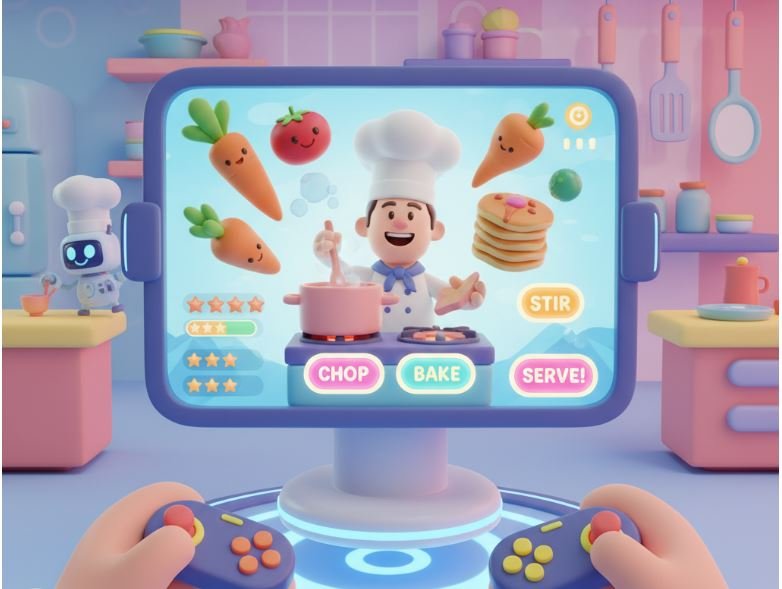In recent years, culinary schools games have become a popular way to combine education with entertainment. These interactive digital experiences allow students, aspiring chefs, and even hobbyists to practice essential cooking skills in a fun, engaging environment. Whether it’s simulating real-world kitchen scenarios, following recipes step by step, or managing a virtual restaurant, culinary games offer an innovative approach to learning. By blending traditional culinary education with modern technology, these games not only make cooking exciting but also help learners build confidence before stepping into a real kitchen.
Why Culinary Games Are Gaining Popularity
The rise of culinary schools games can be attributed to the growing demand for gamified learning experiences. Today’s learners prefer interactive methods instead of passive reading or lectures. Games introduce challenges, rewards, and real-time feedback, which keeps students motivated. Additionally, online cooking games are accessible to anyone with a smartphone or computer, making culinary education more inclusive. The combination of fun and practical learning is a major reason why both culinary students and casual learners are drawn to these games worldwide.
The Connection Between Culinary Schools and Online Games
Culinary schools have recognized the potential of digital tools and integrated culinary simulation games into their training programs. These games simulate the pressure of working in a professional kitchen, teaching students how to manage time, ingredients, and customer demands. For example, many schools now use apps that mimic real cooking processes like chopping, sautéing, and baking. By practicing virtually, students can reduce mistakes when they handle actual ingredients, ultimately saving both time and resources.
Educational Benefits of Culinary Schools Games
The educational benefits of culinary schools games are significant. First, they enhance memory by requiring players to recall recipes, ingredients, and cooking techniques. Second, they improve time-management and multitasking skills, as players often juggle multiple dishes at once. Third, these games boost problem-solving ability, encouraging learners to adapt quickly when something goes wrong in the kitchen. Moreover, they build familiarity with culinary terms, making students more comfortable during real classroom lessons or professional training sessions.
Best Platforms Offering Culinary Games for Students
Some of the best platforms where culinary schools games can be found include websites like Hooda Math Games, Coolmath Games, and Cooking Academy simulators. Mobile apps such as Cooking Fever, World Chef, and Toca Kitchen also provide engaging experiences. For professional learners, specialized platforms developed by culinary schools include virtual chef simulators designed to replicate the environment of a real cooking class. These platforms vary in complexity, offering everything from casual games for beginners to professional-level simulations for advanced students.
How Culinary Games Enhance Cooking Skills
Unlike passive learning methods, culinary games actively engage students by challenging them to make quick decisions and apply cooking knowledge. For instance, a player might be tasked with preparing multiple dishes under time pressure, mirroring the real-life experience of working in a busy kitchen. This develops essential skills such as knife techniques, food safety awareness, portion control, and plating. By playing consistently, students reinforce their culinary knowledge, making them better prepared for both home cooking and professional environments.
Culinary Schools Games for Beginners vs. Advanced Learners
Different culinary schools games are designed for different skill levels. For beginners, casual games like Cooking Mama or Toca Kitchen introduce basic concepts such as ingredient selection and simple recipes. On the other hand, advanced learners benefit from more realistic simulators like Cooking Academy or Chef: A Restaurant Tycoon Game, which emphasize menu planning, budgeting, and restaurant management. This variety ensures that learners of all levels can find games suited to their goals and experience levels.
Real-World Cooking Skills Learned Through Games
Although they are virtual, culinary schools games teach many real-world cooking skills. These include recipe memorization, ingredient combinations, cooking techniques, and presentation styles. Many games also integrate lessons on nutrition, hygiene, and kitchen organization, which are crucial for professional chefs. In fact, practicing virtually allows learners to make mistakes without wasting food, while still learning valuable lessons they can later apply in real kitchens.
Role of Culinary Games in Professional Chef Training
Professional chefs-in-training also benefit from culinary games. Leading culinary schools use advanced cooking simulations that allow students to experience a wide range of cuisines, techniques, and kitchen challenges. For example, learners may practice French pastry-making or Japanese sushi preparation through digital modules before attempting them physically. These simulations build confidence and familiarity with complex recipes, reducing the stress of hands-on training.
Culinary Games for Kids and Teenagers
One reason culinary schools games are so popular is their appeal to younger audiences. Children and teenagers can develop early interest in cooking by playing fun, colorful games designed for their age group. Games like Papa’s Pizzeria, Sara’s Cooking Class, and Toca Kitchen teach basic kitchen knowledge in a safe, entertaining way. This not only inspires creativity but also instills healthy eating habits from a young age.
Culinary School Simulations vs. Casual Cooking Games
It’s important to distinguish between culinary school simulations and casual cooking games. Simulations are realistic, designed for serious learners who want to practice skills needed in a professional kitchen. They often include advanced tasks like knife sharpening, food safety rules, and recipe costing. In contrast, casual cooking games are lighter and more entertaining, focusing on fun experiences like decorating cakes or running a food truck. Both serve their purpose depending on the learner’s goals.
Popular Culinary Schools Games in 2025
As of 2025, some of the most popular culinary schools games include Cooking Simulator VR, Overcooked 2, Chef Life: A Restaurant Simulator, and Cooking Fever. These games provide realistic graphics, immersive experiences, and advanced challenges that mirror real kitchen environments. Many culinary students and hobbyists use these games to sharpen their skills, making them a trend in both professional and casual culinary learning.
How Culinary Schools Integrate Games in Teaching
Today, many culinary schools are incorporating digital games into their lesson plans. They may use simulations for practical training, encourage students to practice recipe memorization through mobile apps, or assign culinary management games as part of coursework. This integration makes education more engaging and bridges the gap between theory and practice.
Advantages of Using Games in Culinary Education
The main advantages of using culinary schools games include accessibility, cost-effectiveness, and engagement. Students can practice at home without the need for expensive kitchen equipment or ingredients. Games also allow for endless practice without real-world risks, such as food waste or safety hazards. Additionally, gamified learning keeps students motivated, making it easier for them to retain knowledge.
Limitations and Criticism of Culinary Schools Games
While useful, culinary schools games are not without criticism. Some argue that they cannot fully replicate the real-world sensory experience of cooking, such as tasting or smelling food. Others believe that relying too much on digital games may reduce hands-on practice. Therefore, culinary schools emphasize that games should supplement, not replace, traditional cooking classes.
Future of Culinary Education with Gamification
The future of culinary schools games looks promising. With advances in virtual reality (VR) and augmented reality (AR), learners will soon experience ultra-realistic cooking environments from their homes. Gamification will continue to play a vital role in modern culinary education, making training more efficient and enjoyable. In the coming years, we may even see entire culinary curricula supported by game-based learning.
How to Choose the Right Culinary School Game
Choosing the best culinary school game depends on your goals. Beginners should opt for simpler games that focus on fun and basic skills. Aspiring chefs, however, should look for realistic simulations that offer professional-level challenges. It’s also important to check whether the game provides educational value or is purely for entertainment.
Free vs. Paid Culinary Schools Games
Many culinary schools games are available for free, but premium options often provide better graphics, more realistic experiences, and advanced lessons. Free games are ideal for casual learners, while paid versions are better suited for students looking for comprehensive training tools. Popular platforms often offer both options, ensuring there’s something for every budget.
Tips for Maximizing Learning Through Culinary Games
To get the most out of culinary schools games, students should practice regularly, treat challenges seriously, and complement digital learning with hands-on cooking. Setting specific goals, such as mastering a cuisine or improving multitasking, helps learners focus. Additionally, discussing experiences with classmates or teachers can enhance learning and make it more interactive.
Conclusion: Culinary Schools Games as the Future of Cooking Education
In conclusion, culinary schools games represent a revolutionary shift in culinary education. By combining fun, technology, and practical learning, they make cooking more accessible and enjoyable for learners of all ages. While they can’t replace hands-on training, they are powerful tools for building confidence, improving knowledge, and preparing for real-world kitchen challenges. As technology advances, the role of culinary games in education will only continue to grow, shaping the future of culinary training.
FAQs
Q1: Are culinary schools games effective for professional chefs?
Yes, advanced culinary simulations help chefs practice complex recipes and kitchen management skills before applying them in real kitchens.
Q2: Can children learn cooking through culinary games?
Absolutely! Many culinary games are designed for kids, teaching them basic cooking knowledge in a safe, entertaining way.
Q3: What skills do culinary schools games teach?
They improve time management, multitasking, recipe memorization, hygiene awareness, and food presentation.
Q4: Are there free culinary school games available online?
Yes, platforms like Hooda Math and Coolmath Games offer free culinary learning experiences, while paid games provide more advanced features.
Q5: Do culinary schools officially use cooking games for training?
Yes, several schools integrate simulations and gamified learning modules as part of their curriculum.
Q6: Which culinary school games are most popular in 2025?
Cooking Simulator VR, Overcooked 2, Chef Life, and Cooking Fever are widely played and recommended.
Q7: Can culinary schools games replace real cooking practice?
No, they can’t fully replace real cooking but are excellent supplementary tools for practice and skill-building.
Explore more Games and stories on Hooda Math







